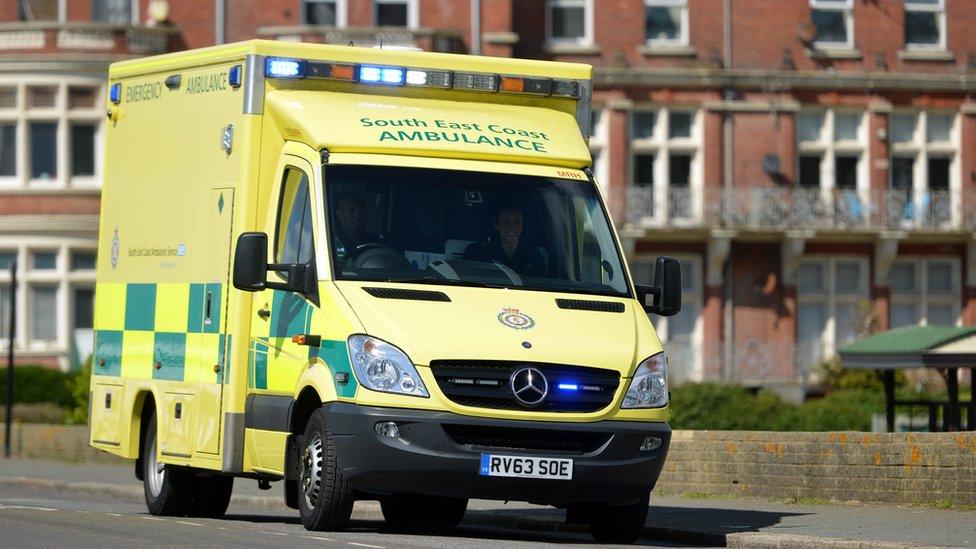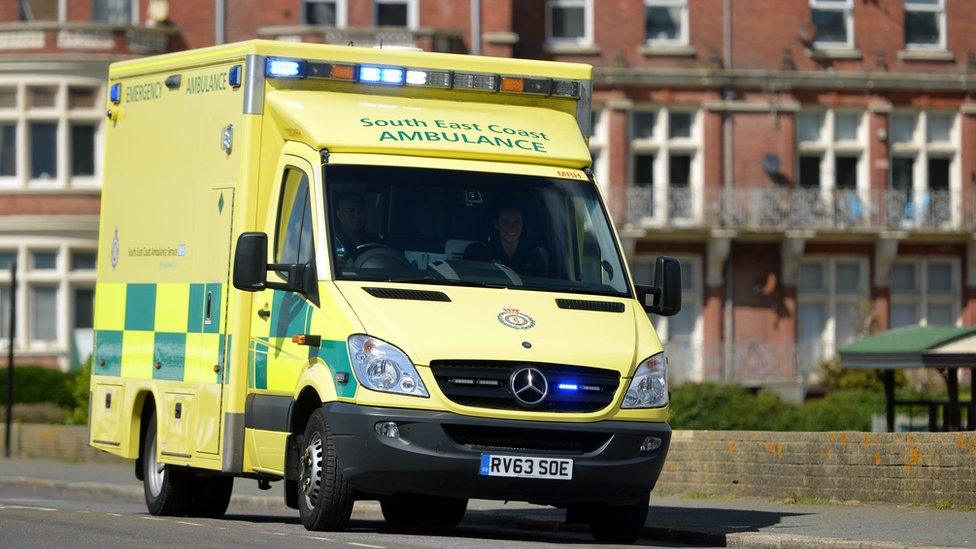Email leaks reveal South East Coast ambulance concerns
- Published

Secamb gave itself an extra 10 minutes to deal with some potentially life-threatening calls
A secret decision by senior managers to delay ambulances to up to 20,000 patients sparked grave concerns within an NHS trust, the BBC has found.
Emails obtained by BBC South East also showed 999 service commissioners could have been unaware of changes.
A South East Coast Ambulance Service (Secamb) manager removed reference to the changes in a report and warned of "reputational damage", emails revealed.
Secamb said the trust and its regulator were working to establish the facts.
Last week it was revealed Secamb is being investigated over the pilot project in which the trust decided to transfer certain 111 calls to the 999 system, thus gaining up to 10 additional minutes to assess patients' conditions.
A leaked NHS England report, expected to be published on Thursday, showed the project was launched in secret by some senior managers and set up without the knowledge of 111 staff, board non-executives, the medical director or local commissioners of services.
In one case where a 60-year-old Horsham man died following a cardiac arrest, there was a "missed opportunity" to improve his outcome, the report said.
The documents reveal:
The ambulance service receives a 111 call at 01:38 GMT from a woman who is concerned about the health of her husband.
During the conversation he appears to go into cardiac arrest and at 01:42 GMT the case is passed to the 999 service through the pilot system.
Staff give themselves 10 minutes to reassess the patient and an ambulance does not arrive at the couple's home until 02:17 GMT, 39 minutes after the initial call.
The man is pronounced dead at 02.55 GMT.
Resignation call
The project was exposed by health regulator Monitor which said the trust had not fully considered patient safety.
Peter Kyle, Labour MP for Hove and Portslade, has called for the person responsible for the pilot to resign.
"I have never called for anyone's resignation since I became an MP but there are four and a half million people in this ambulance area, 25,000 people we now know have been affected and almost 25 lives could have been lost," he said.

Analysis: BBC South East health correspondent Mark Norman
These documents are very significant.
We now know senior staff were aware of grave concerns both within the trust and in other NHS organisations but, as far as we are aware, didn't stop the pilot.
We also know they realised if these fears got out their reputation would be damaged, which is of course what has now happened over the last seven days.
These documents also show a report was amended to remove any reference to what was being done.
Secamb have said they are keen to work "closely" with health regulator Monitor to "establish the facts" but I sense there is some frustration over the amount of time it will take.

A Secamb spokeswoman said: "We welcome Monitor's review and are keen to work closely with them to establish the facts, as we believe much of what has appeared in the media during recent days has been based on incomplete information."
A spokeswoman for Monitor told BBC South East: "As part of our regulatory action, we have asked the trust to carry out a detailed independent review of the impact the project had on patients.
"We have asked the trust to do this with the help of an external expert, who we will select."
Secamb covers Kent, Surrey, Sussex, Brighton and north-east Hampshire.
- Published3 November 2015

- Published30 October 2015
